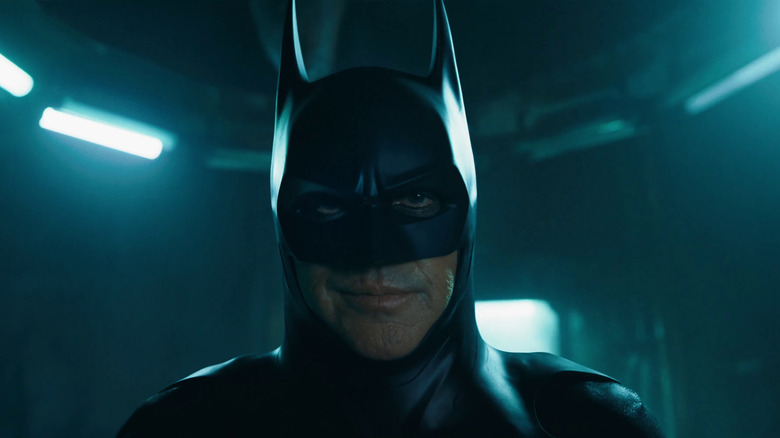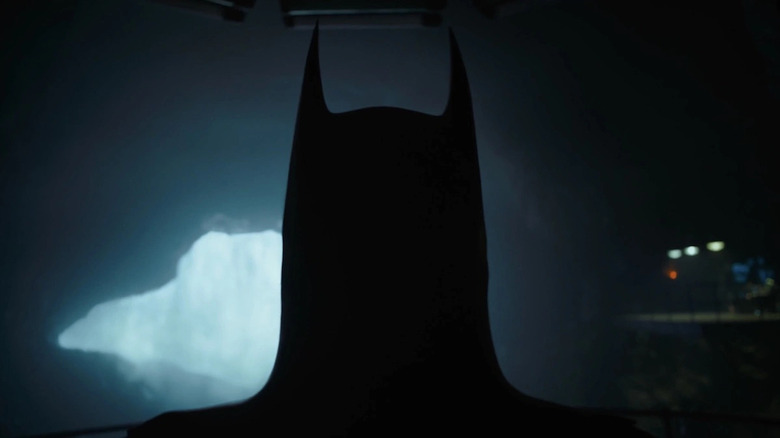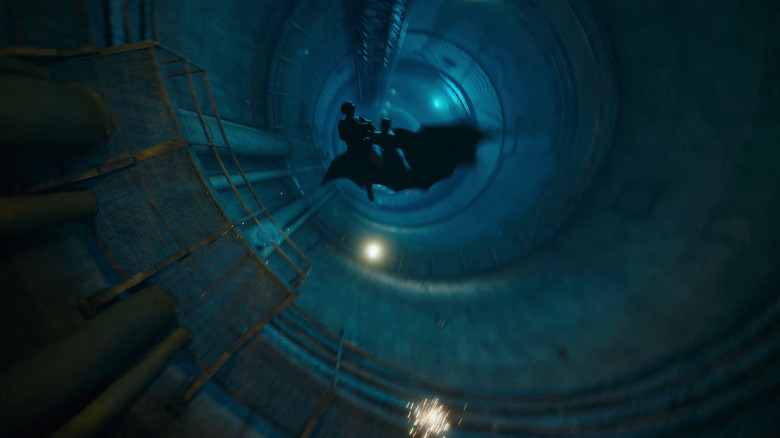Michael Keaton's Batman Is A Senior Citizen In The Flash, And That Rules
Potential spoilers follow.
Academy-Award nominee Michael Keaton will turn 72 in September of 2023. He has had a long and varied career, having appeared in high-profile comedy films, unusual genre films, a few intense thrillers, multiple prestige dramas, and Shakespeare. He also played Batman in two films in 1989 and 1992. Whether or not Keaton resents having played Batman is up for discussion, as he heavily satirized Hollywood's tendency to wrap actors in capes in a 2014 Best Picture winner. Regardless, Keaton may not resent it much anymore, as he also appeared as the villain in a Spider-Man movie in 2017 and now, in 2023, is reprising his Batman role for Andy Muschietti's new film "The Flash."
It's been a long road, getting from there to here. Keaton is as great an actor now as he has ever been, perhaps better, having honed and developed his craft as he's aged. Now in his early 70s, it seems there are no roles Keaton cannot perform, including playing an action hero in a costume, one he left behind decades ago. His reappearance as Batman was, of course, a stroke of fan service by the makers of "The Flash," but there is something weirdly reassuring that a character like Bruce Wayne, finally unclasped by his trauma and post-retirement, still possesses the wherewithal and the nobility to commit acts of heroism.
It's worth noting that in "The Flash," Batman has retired because he was simply too good at his job. Being Batman actually fulfilled a function. Unlike in most Batman stories, his fight against evil isn't a Sisyphusian task of constant struggle and unending trauma revisitation. It seems that Batman will eventually come out on the other side. Getting old, "The Flash" argues, isn't a steady deterioration into futility (à la "Logan"), but a triumph.
It's no drag, getting old
This is a Batman who is not infected with sadness, but who has simply gotten older. The same way we all do. He may be living alone in a giant mansion, cooking himself spaghetti and wearing a bathrobe all day, but Keaton's new Batman is not a sad or tragic figure any longer. It's actually heartening to see an older superhero simply retire to creature comforts. He gives no speeches about how he now feels wasted and futile, or that he requires a legacy or protégé to live on forever. Those kinds of speeches are often written by younger screenwriters, or merely middle-aged ones, who fear becoming old. This Batman isn't worried about a legacy because he's already seen his legacy come to fruition. He aimed to clean up Gotham City ... and he did. Passing on the mantle or going on "one last adventure" isn't on his radar.
In short, it's refreshing to see a superhero story, well, end. It's not until he's presented with a brand new, Earth-threatening villain — the evil General Zod (Michael Shannon) — that Batman decides to suit up again. Not out of guilt, but out of a sense of righteousness. This Batman is old, but he's not weary. He's experienced. He has many exciting Bat Tools and is clever about employing them.
When he, the Flash (Ezra Miller), a time-travel clone of the Flash (also Miller), and Supergirl (Sasha Calle), team up, he leads the charge by default. He's not stepping up and being a leader, he's merely taking action. It's nice to see an older character merely step forward with a Puritan work ethic. This is an older Batman who knows what he's doing. His age lends the character a gentle confidence that one might not see in a younger character.
Learning lessons as a youth
Indeed, one might find that youthful characters, superheroes especially, are featured in stories where they need to learn lessons. As youths, the two Barry Allens still need to grow up, learn not to do damage, make peace with their trauma and grieve. A youthful character allows a screenwriter to write stupid mistakes and impulsive decisions into their stories. This was the decree with the 2009 version of "Star Trek," which saw the main "Star Trek" cast as they appeared in their early 20s. They were younger, angrier, hungrier, hornier than ever before. They could be shifted into overdrive and be rash and reckless. This was a change from the adult, well-reasoned versions of the characters from the 1966 "Star Trek" TV series.
It seems like a greater screenwriting challenge to write a character who has already made the rash decisions, has learned from their mistakes, and is now a more complete, well-rounded person. They have no inner drama because they already went through it and solved it.
Keaton's 71-year-old Batman shows how that maturity can be appealing. Not every character needs to be infused with artificial drama or inner conflict to be interesting. Sometimes a character can just be grown-up and complete when we meet them. They, then, emerge as aspirational figures. An older Batman is fun to watch because we can picture being that someday. As we all get older, we can imagine that, someday in the future, we will indeed have figured something out about living well, attaining our goals, and succeeding in life.
It may have taken decades, but Batman won. Finally. Good for him.


